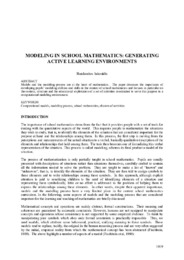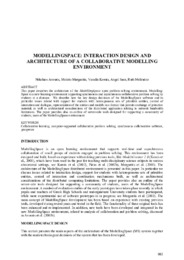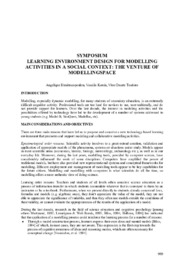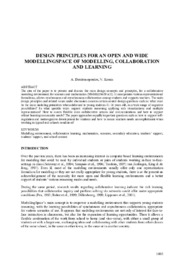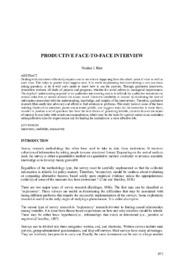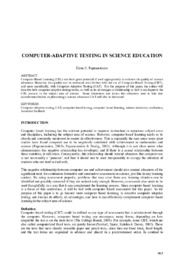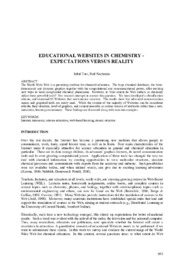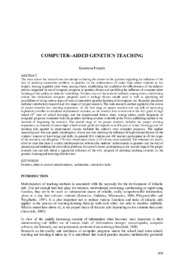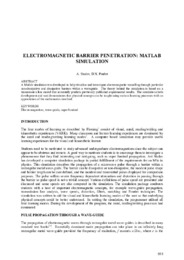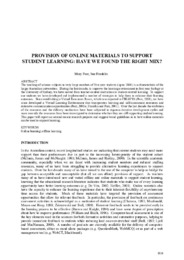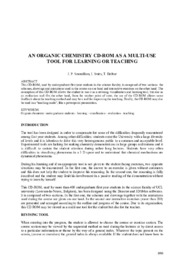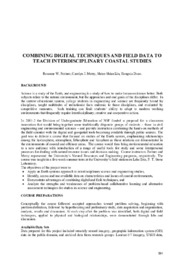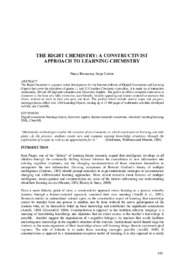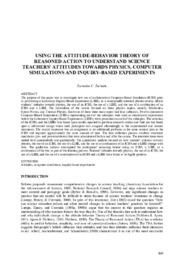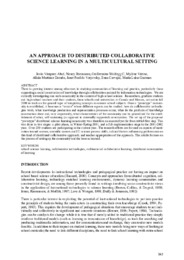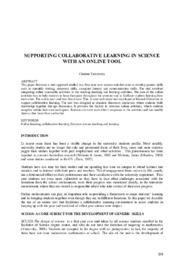ΕΝΔΟ - Ενδοπανεπιστημιακή ερευνητική παραγωγή Πανεπιστημίου Κύπρου: Recent submissions
Now showing items 201-220 of 608
-
Modeling in school mathematics: generating active learning environments
(Department of Educational Sciences, University of Cyprus, 2003)Models and the modeling process are at the heart of mathematics. The paper discusses the importance of developing pupils’ modeling abilities and skills in the context of school mathematics and focuses in particular on the ... -
Modellingspace: the setting up of human networks as vital part of the design and implementation of a technology-supported learning environment
(Department of Educational Sciences, University of Cyprus, 2003)The ModellingSpace (MS) project is concerned with developing and implementing a computer-based modelling learning environment in actual school contexts and preparing an education programme for the teachers involved in it. ... -
Modellingspace: interaction design and architecture of a collaborative modelling environment
(Department of Educational Sciences, University of Cyprus, 2003)This paper describes the architecture of the ModelllingSpace open problem-solving environment. Modelling- Space is a new learning environment supporting synchronous and asynchronous collaborative problem solving by students ... -
Symposium Learning environment design for modelling activities in a social context: the venture of modellingspace
(Department of Educational Sciences, University of Cyprus, 2003) -
Design principles for an open and wide Modellingspace of modelling, collaboration And learning
(Department of Educational Sciences, University of Cyprus, 2003)The aim of the paper is to present and discuss the main design concepts and principles, for a collaborative modeling environment for sciences and mathematics (MODELLINGSPACE). It incorporates various representational ... -
Computer-adaptive testing in science education
(Department of Educational Sciences, University of Cyprus, 2003)Dealing with interviews effectively requires one to see what is happening from the other's point of view as well as one's own. This helps to predict what happens next. It is worth emphasizing that interviewing is not just ... -
Productive face-to-face interview
(Department of Educational Sciences, University of Cyprus, 2003)Computer Based Learning (CBL) can have great potential if used appropriately to enhance the quality of science education. However, this quality can be enhanced even further with the use of Computer Based Testing (CBT), and ... -
Educational websites in chemistry - expectations versus reality
(Department of Educational Sciences, University of Cyprus, 2003)The World Wide Web is a promising medium for chemical education. The huge chemical databases, the threedimensional and dynamic graphics together with the computational and communicational power, offer exciting new ways to ... -
Epistemic perspective on a conceptual evolution in physics at the secondary level
(Department of Educational Sciences, University of Cyprus, 2003)The research deals with qualitative understanding of physics notions at the secondary level. It attempts to identify and to label, in the verbalizations of 12 to 16 year-old students, the tendencies that guide their cognitive ... -
Computer–aided genetics teaching
(Department of Educational Sciences, University of Cyprus, 2003)The main aim of the research was the attempt at finding the answer to the question regarding the influence of the way of realizing curriculum problems in genetics on the achievements of junior high school students in this ... -
Electromagnetic barrier penetration: matlab Simulation
(Department of Educational Sciences, University of Cyprus, 2003)A Matlab simulation was developed to help visualise and investigate electromagnetic tunnelling through particular non-dissipative and dissipative barriers within a waveguide. The theory behind the simulation is based on a ... -
Provision of online materials to support student learning: have we found the right mix?
(Department of Educational Sciences, University of Cyprus, 2003)The teaching of science subjects to very large numbers of first year students (up to 1800) is a characteristic of the larger Australian universities. During the last decade, to improve the learning environment in first ... -
An organic chemistry cd-rom as a multi-use tool for learning or teaching
(Department of Educational Sciences, University of Cyprus, 2003)This CD-ROM, used by undergraduate first year students in the science faculty, is composed of two sections: the schemes, drawings and animations used in the course on one hand and interactive exercises on the other hand. ... -
Development of a computer assisted learning environment of electromagnetics at the undergraduate level
(Department of Educational Sciences, University of Cyprus, 2003)Conventional teaching of electromagnetics, based on lectures, static written materials, laboratories etc. has become rather difficult recently at all levels of education. The main objective of this paper is the development ... -
Online physics lecture notes
(Department of Educational Sciences, University of Cyprus, 2003)Internet is a very powerful medium and is being widely used by the academic community. A large amount of resource on physics education in the form of lecture Notes, online lectures, books, databases and journals are ... -
Combining digital techniques and field data to teach interdisciplinary coastal studies
(Department of Educational Sciences, University of Cyprus, 2003) -
The right chemistry: a constructivist approach to learning chemistry
(Department of Educational Sciences, University of Cyprus, 2003)The Right Chemistry is a project under development for the Internet delivery of Digital Courseware and Learning Objects that cover the objectives of grades 11 and 12 Canadian Chemistry curriculum. It is made up of interactive ... -
Using the attitude-behavior theory of Reasoned action to understand science teachers' attitudes towards physics, computer simulations and inquiry-based experiments
(Department of Educational Sciences, University of Cyprus, 2003)The purpose of this paper was to investigate how use of an Interactive Computer-Based Simulation (ICBS) prior to performing a Laboratory Inquiry-Based Experiment (LIBE), in a conceptually oriented physics course, affects ... -
An approach to distributed collaborative science learning in a multicultural setting
(Department of Educational Sciences, University of Cyprus, 2003)There is growing interest among educators in studying communities of learning and practice, particularly those supporting a social construction of knowledge through collaboration assisted by information technologies. We ... -
Supporting collaborative learning in science with an online tool
(Department of Educational Sciences, University of Cyprus, 2003)This paper discusses a new approach trialled in a first year core science unit that aims to develop generic skills such as scientific writing, numeracy skills, computer literacy and communication skills. The trial involved ...
